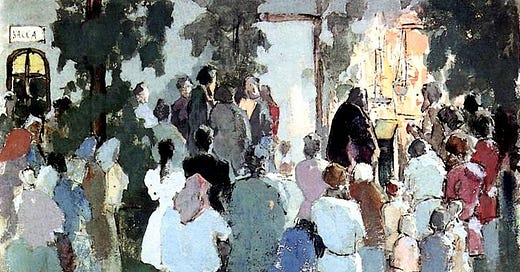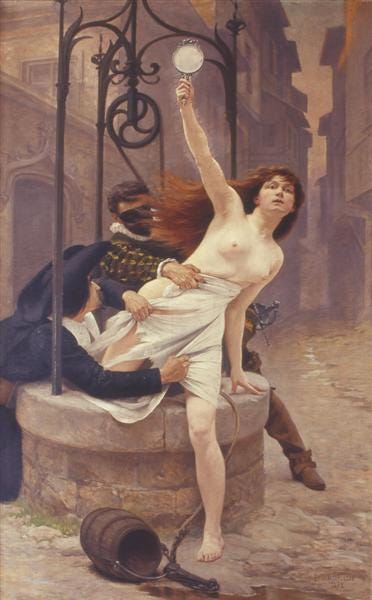Hello, my friends,
I’ve been spending a lot of time outdoors these days for work and boy is it hot! Thankfully, most of the time is spent under a canopy telling people about the library, which is generally a nice way to spend a few hours. I’ve also been sweating at home about every other evening, doing a calisthenics workout routine of my own invention. Otherwise, just trying to keep my brain from devoting cycles to the rampant ravages of the hubbub around the presidential race. It’s like Richard Rohr wrote in his essay “Christians and the Political Commitment” in the book I’m currently reading, Simplicity: The Art of Letting Go (Crossroad Publishing, 2003), “The political systems of this world have no patience” (74). While he was talking about greater socioeconomic structures, an angle of the insight also applies to the speed of the ridiculous ad-hominem click-bait that passes for political news today. Before it makes me angry, I have to disengage. The butterfly I saw weaving among un-moving freeway traffic a couple of weeks ago was not concerned what rank Vice Presidential candidate, Tim Walz, retired with after serving 24 years in the National Guard. Probably because he had not yet been announced as Kamala Harris’s running mate. It’s possible that the bug is furious now, I guess.
In unrelated news: If you know of any coin collectors, can you respond to this email or post in the comments? My father has some coins to part with and could use some advice.
Muscle Up
I’ve always found the plain act of exercising dull, but I was talking to friend today (hi, Kim!) and the reasons I am now enjoying my calisthenics sprung forth unbidden. There are three main ones: 1) When I come up with my own routine, I have reasons for choosing each exercise and the amount of repetitions; mostly there are specific muscles I want to stretch and strengthen and through watching a bunch of YouTube videos and looking at a few books, I could choose the ones I feel are most effective for me. This sense of control is important to my buy-in. 2) I’ve mentioned it before (back in #9), but I like pushing myself. The right amount of struggle is engaging for me because it’s satisfying to say “Let’s do this! Keep going!” in the moment and then, having done it, to enjoy a sense of accomplishment. 3) There are the bigger rationales of the positive benefits of movement and exercise generally in various areas of life and the smaller motivation of preparing to return to Brazilian Jiu-Jitsu. As an almost-40-year-old looking to jump into this activity, I’d like to lessen the chance of low-hanging-fruit injuries associated with not being flexible and reasonably fit.
Not to mention, the more I exercise, the closer I get to looking like a hairy version of this guy:
p.s. - Two days ago, I reached a peak of 95 burpees in one day. Not straight through, but progress nonetheless. Right now, I can maintain proper form doing 22 and increasing that number week by week. As I keep up with calisthenics, it might be fun (of a sort) to add the additional side quests of mastering pistol and sissy (Sisyphus) squats.
Religion by Default
I gained some insight on the political situation in Israel and a larger sense of world Jewry from reading Tal Keinen’s God is in the Crowd (Random House, 2018), but those aren’t the things I want to highlight here. Instead, what I found surprising is Keinen’s point-of-view on the Jewish identity of non-observant Israelis, more specifically, the idea of a how a majority religion allows for the maintenance of a religious identity without metaphysical belief or consistent ritual. The perspective isn’t surprising as in shocking or especially deep, it’s just one I hadn’t considered. Basically, the majority of Isrealis can be non-observant and still consider themselves Jewish because the country/local society itself, has various affordances that make some Jewish observance more or less the default. For instance, finding kosher food, being off from work on holidays, following the Sabbath because many things are closed on Saturdays (I think public transit is even non-operational in some cities), are all just normal occurrences.
This is similar to the Christian default in the United States which purports not to be a “Christian Nation.” Yet, why are most professional jobs closed on Sundays? Why do government employees get Christmas off from work? Why do stores have gigantic displays for Easter months in advance? And don’t people swear on a bible in court? Christianity is the majority religion in the United States so it’s not totally wild that there are occasional public prayers in Jesus’ name. As a rootless cosmopolitan, none of this has ever bothered me — I came to this country from another and just as when you come to someone’s house, you don’t complain about their rules, I’m happy to return a jolly “Merry Christmas” to people in December even though it isn’t a religiously notable time for me.
I suspect that many people with various feelings about the existence of Israel may not think about this little point that it is the only country in the world where Judaism is the default religion. There are many countries where Christians, Muslims, Buddhists, and Hindus predominate which is, to a certain extent, a privilege. In some of those countries, members of the world’s four most popular religions can be as observant as they want to be and yet still feel like they are part of something bigger. While I am not a Zionist (had Birobidzhan worked out, fine), I think it is important to recognize the the symbolic importance of the political state of Israel as a facet of the religious identity of Jews in the diaspora (if such a term would even be recognized as referring to Jews by anti-Zionists).
Venetian Nostalgia
About a month ago (#73), I wrote about Japanese manga artist Jiro Taniguchi’s nostalgic book, A Distant Neighborhood. This week, I drank a latte and enjoyed his book, Venice, Taniguchi’s contribution to the series, Louis Vuitton Travel Books, in which well-known artists represent the world’s cities in their own style.
Taniguchi uses pencil and watercolor to portray attractive, vintage postcard-inspired views of Italy’s ancient city of canals. And very much in his specific mode, there is a light, vague story of the dapper young narrator finding a box of his mother’s photos and exploring Venice in order to learn more about his grandfather who was an artist there.
Among the typical Venetian scenes, the unnamed narrator also locates places where his grandparents and mother had visited and even lived. With each find, he feels closer to a relative he never knew in life. As with Taniguchi’s approach in A Distant Neighborhood, Venice creates a poignant (albeit much lighter) bond between present and past that adds a special significance to what would otherwise be an ordinary trip.
Though ordinary in the touristic sense, the drawings in Venice are notable for their variety of scenes, some dramatic, some peaceful, all allowing the beauty of Venice to captivate the reader. Having never been to Venice, looking at this book inspired an urge to go. The ideal effect from such a book!
Time Machine
Here’s what I wrote in HMF a year ago (in issue #24):
Watering the Plant: The joys of giving a housewarming plant a shower.
Remembering Natura Spa: A tribute to my favorite k-spa which, sadly, closed in 2018.
Bobalicious: Having had my first boba drink a month before, I wrote about having several more.











my husband is from Iran, where basically anyone born Muslim better stay that lest horrible things happen to them & their loved ones. so here we have the wonderful luxury of not having to be religious. my father grew up in Spain, during Franco's worst, when was Catholicism was forced, so he was over joyed to not be religious here. dunno about coins except for the great town squares in Barcelona where old men would gather to trade them & stamps. It seems that the worth of something is way different than actually getting someone to pay that, alas. as for exercise, I'm enjoying zumba right now - it's a total happiness pill amid extraordinarily friendly classmates, no matter the club
the observation about a common faith binding together a culture is not without merit, even if that faith is secular/cultural rather than practiced. I experience this whenever I'm in Europe, more so on the continent than in British, but also there. Even in the secular culture of Europe (far more secular than the US -- they don't fight about whether religion should be taught in schools, etc. the way we do because. reasons.), I can fee a cultural cohesion that I don't feel elsewhere. Cultural monuments, traditions are quietly bound up in the common spiritual heritage and even though my thoughts on organized religion are... less than charitable... I can't deny that it gives the vibe in a European city a substance and a richness that seems utterly lacking in the US.
It's weirder in Britain, because the constitutional monarchy makes the sovereign the head of the church and I think that makes people in very secular modern Britain a bit more uneasy than in, say, France, where they got rid of all that stuff in the revolution. But it's still there and again, there's substance there that's lacking here.
PS -- for what it's worth, and your Lady may be the exception and if so, god speed on the calisthenics, but I have yet to meet a woman who pants after the guy in the video. He looks too much like a cartoon. (tbf, I don't experience sexual attraction to men (or women), so I may be attracting friends who feel similarly)